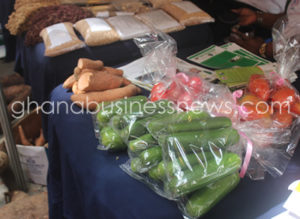Soilless vegetable production introduced in Upper East
 Soilless Vegetable Production, a new technology of producing hygienic and large quantity vegetables without the use of soil has been introduced to two farmer groups in the Upper East Region.
Soilless Vegetable Production, a new technology of producing hygienic and large quantity vegetables without the use of soil has been introduced to two farmer groups in the Upper East Region.
The project, which aims to empower farmers to produce vegetables without necessarily demanding for land is being implemented by the School of Agriculture with the Department of Crop Science at the University of Ghana with funding support from the Skills Development Fund (SDF), a Non- Governmental Organisation (NGO).
The farmer groups include; the Nyariga-Doone Women Association in the Bolgatanga Municipality and Bongo-Nyariga Cooperative Farmers Association in the Bongo District.
The technology requires the growing of nutritious, clean and hygienic vegetables without the use of soil. The system makes use of locally available materials such as saw dust, rice husk, cocopeat and cow dung or poultry manure and these materials have the ability to retain water, and release nutrients for the plant’s growth.
Explaining the method, Dr Eric Cornelius, Senior Lecturer with the Department of Crop Science, University of Ghana stated that in preparing the media or substrate, one could choose to mix the saw dust, rice husk and cow dung or poultry litter together under shade and water and compost for 12 weeks.
On the other hand, one could mix cocopeat and cow dung or poultry manure with water together which does not require any time to be ready for use.
Explaining further the processes, Dr Cornelius said one could “fill substrates into nursery boxes which could be wooden boxes, buckets, plastic planting trough, plastic bags among others and water and plant seeds directly or transplant seedlings into them.”
The Senior Lecturer who urged the groups to adopt the innovation, indicated that the method was less expensive to practice because it was not labour intensive and did not require big land space to practise in large quantity.
He indicated that with the use of the new technology, vegetables could be produced anywhere including cemented backyard, and added that crops grown using the soilless method were free from some of the soil diseases such as fungi and anima-dotes as well as being environmentally friendly.
Dr Cornelius stressed that the new technology which had more women benefitting would enable farmers to produce vegetables in commercial quantities to ensure vegetable security and augment their incomes and improve their livelihoods.
He announced that two farmers, as well as a representative from the Ministry of Food and Agriculture (MoFA) would be given practical training at the University who would in turn replicate the skills acquired to their colleague farmers while the implementing team would be paying periodic visits to the communities to ensure that the right things are done.
Mr Augustine Zoogah, Extension Officer at the Bolgatanga Municipal office of MoFA lauded the initiative and said the knowledge acquired at the training would be put into good use especially at the various operational zones to increase vegetable production in the region.
He pledged his outfit’s commitment to supporting the project to succeed and added that the successes of these farmer groups would be used as reference points to sensitise other communities to adopt and use the method to increase productivity.
Reverend John Akaribo, the Coordinator of the Nyariga-Doone Women Association thanked the implementing team and the sponsors for selecting his group to benefit from the support, adding that the initiative was a big relief to the women in particular since its practice did not require acquisition of land that had been a major challenge for women interested in farming.
Source: GNA
